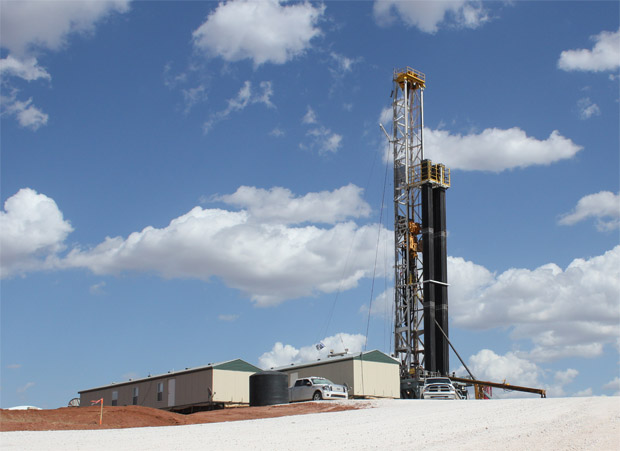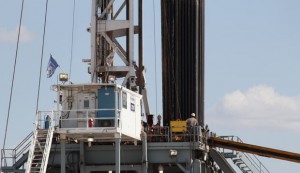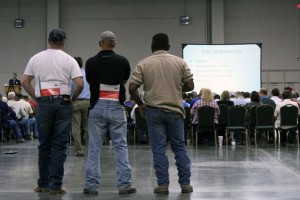
A Helmerich & Payne rises above the prairie near Geary, Okla.
Joe Wertz / NPR StateImpact


A Helmerich & Payne rises above the prairie near Geary, Okla.
Joe Wertz / NPR StateImpact

Joe Wertz / NPR StateImpact
A Helmerich & Payne drilling rig rises above the prairie near Geary, Okla.
Debates over American energy policy often center on the environment and independence. But states like Oklahoma depend on petroleum — especially workers in the oil and gas fields.
Technology has fueled a boom and revolutionized production, but the task of extracting oil and gas is still hands-on, high-pressure and high-risk.
Politicians argue over industry regulation, but workplace safety discussions are often below the surface. Meanwhile, deaths from work-related accidents in Oklahoma’s oil and gas fields are the highest they’ve been years.
[module align=”right” width=”half” type=”pull-quote”]
“We just had this new baby. It’s supposed to be one of the happiest times of your life and then — tragedy.”
[/module]
Domestic oil production has jumped in recent years, and the number of natural gas wells in the United States has soared almost 50 percent over the last decade.
In Oklahoma, nine men have died from accidents in oil and gas fields since October 2011, when the federal fiscal year began. That’s the industry’s highest rate since 2008, when the industry saw 14 deaths in the state, data from the federal Occupational Safety and Health Administration show.
The uptick has worried industry and government safety officials. It also has oilfield workers and their families alarmed and demanding a response. Hundreds of them gathered in Oklahoma City in June to review the details of the fatal accidents at a meeting sponsored by OSHA, the state Department of Labor and the Mid Continent Exploration and Production Safety Network.

Joe Wertz / StateImpact Oklahoma
Rig crews hard at work on a Helmerich & Payne operation in western Oklahoma.
Government officials and safety coordinators at drilling and oilfield service companies hope that sharing such details will help the industry target its response, and curb this year’s trend of accidents.
Historical statistics on deaths in specific industries are unreliable — collection methods have changed throughout the decades and some are purposely vague to protect worker privacy. But the number of oilfield fatalities documented in 2008 marked a recent record and was the worst year that David Bates, OSHA’s Oklahoma director, could dig up.
“The industry is not forgiving when it comes to the equipment that they use. It’s big, and it moves fast,” Bates says. “The fatality rates are higher because when something does happen, it’s usually bad.”
Organizers were surprised at how many oilfield workers showed up to the June meeting. Most of those who attended were so-called roughnecks — men who worked in the oilfield; many were safety supervisors for drilling, exploration and service companies.

Joe Wertz / StateImpact Oklahoma
In June, hundreds of oilfield workers gathered in Oklahoma City for a meeting addressing this year's spike in work-related deaths.
It was a tough crowd: boots, buckles and cowboy hats are part of the uniform. Still, several workers wiped away tears as accidents involving friends and co-workers were reviewed.
Safety officials encouraged Oklahoma drillers and service companies to schedule voluntary “stand downs” at job sites. The idea is that fieldwork would be halted temporarily so workers and supervisors could review safety standards and procedures, and relay information from the Oklahoma City meeting.
Oil and gas extraction is dangerous, but drilling in Oklahoma is relatively unregulated when it comes to safety.
The state Corporation Commission issues drilling permits, but field operations manager Wayne Wright says most of their authority is environmental in nature. The agency does inspect operations planned in areas where there’s hydrogen sulfide — a toxic and flammable gas common in petroleum production — and investigates if there’s a major oilfield accident, like a blowout.
OSHA, too, is largely an enforcement operation, Bates says. The Oklahoma office has five inspectors for the oil and gas industry.
In April, when it was clear the number of oilfield fatalities was trending up, OSHA borrowed four inspectors from a Texas office for a two-week inspection that covered roughly 75 rig and servicing sites in Oklahoma. There are more than 190 active rigs in Oklahoma right now, according to data compiled by oil services company Baker Hughes. And more than 3,500 wells were “completed” — drilled and readied for production — in 2010, according to the most recent numbers available from the Corporation Commission.
StateImpact contacted more than a dozen Oklahoma drilling companies seeking permission to let a reporter observe rig safety in the field, first-hand. Only three returned our calls and emails, but our request was denied.
Suzie Black is obsessed with oil. The front porch of her McAlester home is framed by a pair of rusty, antique drill bits. A silver drill bit pendant hangs from her necklace — and her key chain. She has oil-related bumper stickers and license plate frames and photos of drilling rigs on her phone.

Joe Wertz / StateImpact Oklahoma
Suzie Black and her daughter, Madison, in front of their McAlester home. Black worries about the safety of her husband, Steve, who works on a drilling rig.
Black even loves the smell of oil, because it reminds her of her roughneck husband, Steve, who currently works on a rig in Arkansas.
“It just seems American, I don’t know why. I just love it,” Black says. “I’ll bring my husband’s rig clothes in and wash them in my washer and dryer. Most women are like, ‘Oh, no, no, you take them to the laundromat!’ But I wash mine here.”
Oil and gas have been good to her family, and Black is proud to be the wife of a roughneck. But life for roughnecks and their families can get tough — and oilfield accidents happen fast.
When you look at the data that underlies Oklahoma’s oilfield deaths, a pattern emerges. The average worker killed is young — only 35. Their tenure at the company is often short — less than five years. Most of the men died after being crushed or struck by equipment, and most of the accidents happened at small drilling or service companies with less than 100 employees.
“Usually they don’t have the safety resources,” Bates says about smaller drilling companies. But safety officials at small drilling companies can lean on their counterparts at bigger oil and gas operations, which he says are eager to help. Many small oil and gas companies that lack safety resources are also eligible for free, tax-subsidised safety consultations from OSHA officials through a state Department of Labor program.
Chris Albert loved the outdoors, and started working in the oilfields when he was still a senior in high school. He had been out of work since Spring 2009 and his fiancée, Natasha Noreuil, had just given birth to their daughter, Charity. He was 25 when he took a job at Cactus Drilling. The young family welcomed the paycheck.

Joe Wertz / StateImpact Oklahoma
Natasha Noreuil and her two daughters, Charity and Cassie, at their home in Woodward. Charity's father, Chris Albert, died after an oilfield accident in 2009.
“If school isn’t your thing, that’s what you do,” Noreuil says from her current home in Woodward.
It was Nov. 17, 2009. Noreuil was excited because Albert was supposed to get off work early. Offered the choice of two assignments, Albert and another man, Randy Baumann, chose the Elk City job because it was closer to their homes in Vici. The men carpooled to work that morning.
Neither returned.
Workers were using a 275-ton hydraulic crane to erect the mast of a drilling rig, when a six-foot beam fell to the ground. Baumann was killed; Albert was taken by helicopter to a hospital in Oklahoma City.
Noreuil says the drive was a blur. The scene at the hospital was chaotic. Family and friends gathered and waited for an update from hospital staff.
“The doctor comes in and says, ‘He’s sustained a non-survivable injury,’” Noreuil recalls. “We just had this new baby. It’s supposed to be one of the happiest times of your life and then — tragedy.”
Albert’s twin brother Shane worked in the oilfield, too, but Noreuil says he found a new line of work after the accident. A lot of Albert’s friends did the same.
Dating was tough after the accident, Noreuil says, but she’s trying to move forward. Noreuil, her two daughters — Charity and Cassie — and Noreuil’s boyfriend just moved into a new house.
Her boyfriend works in the oil and gas industry, too. He drives a nitrogen truck that servcies oil and gas sites. She says she worries about his safety all the time, but at least he doesn’t work on a rig.